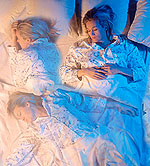
WEDNESDAY, Nov. 21 (HealthDay News) — A substance found in spinal fluid could act like a natural sleeping pill and help cause hypersomnia, a condition where people sleep more than 70 hours a week, a small new study suggests.
Despite their excessive sleeping, people with the condition also have difficulty waking up in the morning, the researchers noted, and even when awake their reaction times are comparable to someone who has been sleepless all night. Hypersomnia can greatly interfere with patients’ daily lives, and conventional treatments such as stimulants do little to help them.
“These individuals report feeling as if they’re walking around in a fog — physically, but not mentally awake,” study lead author Dr. David Rye, professor of neurology at Emory University School of Medicine, in Atlanta, and director of research for Emory Healthcare’s Program in Sleep, said in a university news release.
Rye and his colleagues looked at seven hyper-sleepy patients and found that their cerebrospinal fluid contained a substance that enhances the effects of a brain chemical called gamma-amino butyric acid (GABA), which is one of the main inhibitory chemicals of the nervous system.
On average, the substance more than doubles GABA receptor function in the patients.
“In some of the more severely affected patients, we estimated the magnitude of the GABA-enhancing effect as nearly equivalent to that expected for someone receiving sedation for outpatient colonoscopy,” Rye said. “This is a level of impaired consciousness that many subjects had to combat on almost a daily basis in order to live their usual lives.”
“When encountering excessive sleepiness in a patient, we typically think it’s caused by an impairment in the brain’s wake systems and treat it with stimulant medications,” Rye said. “However, in these patients, the situation is more akin to attempting to drive a car with the parking brake engaged. Our thinking needs to shift from pushing the accelerator harder to releasing the brake.”
The study was published online Nov. 21 in the journal Science Translational Medicine.
Merrill Mitler, a program director at the U.S. National Institute of Neurological Disorders and Stroke, commended the study.
“Primary hypersomnias are disabling and poorly understood. This study represents a breakthrough in determining a cause for these disorders and devising a rational approach to therapy,” Mitler said in the news release. “Further research is required to determine whether or not the results apply to the majority of patients.”
Although the study found an association between this particular spinal-fluid substance and hypersomnia, it did not prove a cause-and-effect relationship.
More information
The U.S. National Institute of Neurological Disorders and Stroke has more about hypersomnia.

